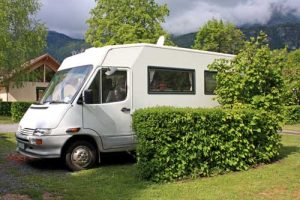Motor Home Hookup
Serving Portland – Beaverton – Newberg – Salem – Canby
 It’s a shame that most recreational vehicles go unused unless the owners are traveling on vacation. That’s usually only a couple of weeks out of the year, if that. The RV isn’t doing anyone any good sitting in the driveway or garage. It just makes good sense to invest in a RV hookup for a home, mountain retreat or seashore getaway. The motor home will be ideal for house guests or even as temporary lodging for someone that is struggling financially. It might even be a good place to exile a teenager or two every so often. Yes, a motor home hookup is a great idea, but hooking up an RV isn’t a job for an amateur electrician. Safety, especially fire safety, is never optional. Hire a professional electrician to turn that recreational vehicle into a reasonably priced home addition.
It’s a shame that most recreational vehicles go unused unless the owners are traveling on vacation. That’s usually only a couple of weeks out of the year, if that. The RV isn’t doing anyone any good sitting in the driveway or garage. It just makes good sense to invest in a RV hookup for a home, mountain retreat or seashore getaway. The motor home will be ideal for house guests or even as temporary lodging for someone that is struggling financially. It might even be a good place to exile a teenager or two every so often. Yes, a motor home hookup is a great idea, but hooking up an RV isn’t a job for an amateur electrician. Safety, especially fire safety, is never optional. Hire a professional electrician to turn that recreational vehicle into a reasonably priced home addition.
Can I hook an RV up to my house’s electrical system?
The short answer is yes, you can hook up your RV to your home’s electrical system. Keep in mind, you will be very limited on the electrical appliances you can use in your RV. To fully take advantage of what your RV has to offer it’s recommended you talk with an electrician to have a 30 or 50 amp receptacle installed near your RV pad.
What is the Standard RV Electrical Hookup?
The standard for RV electrical hookups are generally 30 amp or 50 amp.
Do You Need 30 amp or 50 amp service for your RV hookup?
An easy way to determine if you need 30 amp or 50 amp service for your RV hookup is to inspect your RV’s electrical plug, which is usually stored in the electrical compartment on the side of your RV. If the plug has three prongs, it uses 30 amp service, and if it has 4 prongs, it uses 50 amp service.
Is there an adapter to convert 50 amps to 30 amps?
If your home or RV site only has a 30 amp hookup available, you will need to use an adapter to change the amperage. There are many adapters available that let you plug your RV’s 50-amp male plug into a 30-amp receptacle.
Receive a free Home Electrical Service estimate
or Schedule Service!
Click below to submit your information and get a call back from our experienced electrical contractors.
RV Hookup
The first thing that RV owners ask is whether they can just run an extension cord from the house to the motor home. The answer is yes, but there are several important caveats. Although it is acceptable to connect an RV to a standard electrical outlet by using a short, weatherproof extension cord, it would be better, not to mention safer, to ask a licensed electrician to evaluate the situation. It ultimately depends on the rating of the home electrical circuit being used and the electrical needs of the motor home and tenants.
A better option is to hire a qualified electrician to add an additional wire to the circuit panel. This solution will work under the following circumstances:
- The guests will be staying only a few days.
- Only one or two people will be living in the RV.
- The tenants will only be using low wattage appliances such as the television, light fixtures and refrigerator.
Motor Home Hookup
The best option is to have a professional electrician install a dedicated 50 watt circuit to meet the electrical needs of RV tenants. This is especially true if the tenants will be living in the motor home for more than 30 days or will be using major appliances such as a heater, air conditioner, microwave, dishwasher or hair dryer. Most homes are equipped with 15 to 20 amp electrical circuits, but most motor homes are wired with 30 or 50 amp circuits. Adding a dedicated 50 amp electrical circuit is the ideal way to safeguard the performance of RV appliances and reduce the risk of fire. An RV hookup is the next best thing to adding a couple of rooms to a home or vacation getaway. Hiring a licensed electrician to install a motor home hookup will ensure that both homeowners and guests sleep safely through the night.
RV Hookup serving Portland Beaverton Newberg & Canby
Serving Clients in the State of Oregon:


